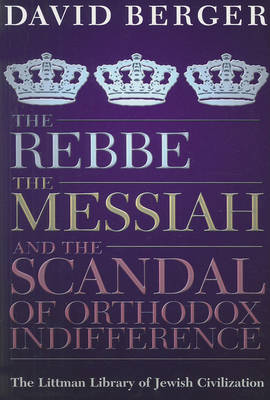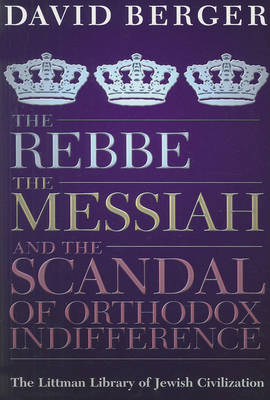
- Retrait gratuit dans votre magasin Club
- 7.000.000 titres dans notre catalogue
- Payer en toute sécurité
- Toujours un magasin près de chez vous
- Retrait gratuit dans votre magasin Club
- 7.000.0000 titres dans notre catalogue
- Payer en toute sécurité
- Toujours un magasin près de chez vous
The Rebbe, the Messiah, and the Scandal of Orthodox Indifference
With a New Introduction
David BergerDescription
This book is a history, an indictment, a lament, and an appeal, focusing on the messianic trend in Lubavitch hasidism. It demonstrates how hasidim who affirm the dead Rebbe's messiahship have abandoned one of Judaism's core beliefs in favour of adherence to the doctrine of a second coming. At the same time, it decries the remarkable equanimity with which the standard-bearers of Orthodoxy have granted legitimacy to this development by continuing to recognize such believers as Orthodox Jews in good standing. This dramatic abandonment of the age-old Jewish resistance to a quintessentially Christian belief is a development of striking importance for the history of religions, and it is an earthquake in the history of Judaism. David Berger chronicles the unfolding of this development from a personal viewpoint. He describes the growing concern that impelled him to undertake an anti-messianist campaign-publications, correspondence, and the sponsorship of a Rabbinical Council of America resolution excluding this belief from authentic Judaism.
He argues that a large number, almost certainly a substantial majority, of Lubavitch hasidim believe in the Rebbe's messiahship; a significant segment, including educators in the central institutions of the movement, maintain a theology that goes beyond posthumous messianism to the affirmation that the Rebbe is pure divinity. While many Jews see Lubavitch as a marginal phenomenon, its influence is in fact growing at a remarkable rate-to the point where its representatives are poised to dominate Orthodox religious institutions not merely in isolated outposts but in several major countries throughout the world. This book analyses the boundaries of Judaism's messianic faith and its conception of God. It assesses the threat posed by the messianists of Lubavitch and points to the consequences, ranging from undermining a fundamental argument against the Christian mission to calling into question the kosher status of many foods and ritual objects prepared under Lubavitch supervision. Finally, it proposes a strategy to protect authentic Judaism from this assault.
Spécifications
Parties prenantes
- Auteur(s) :
- Editeur:
Contenu
- Nombre de pages :
- 240
- Langue:
- Anglais
- Collection :
Caractéristiques
- EAN:
- 9781904113751
- Date de parution :
- 01-03-08
- Format:
- Livre broché
- Format numérique:
- Trade paperback (VS)
- Dimensions :
- 155 mm x 231 mm
- Poids :
- 376 g

Les avis
Nous publions uniquement les avis qui respectent les conditions requises. Consultez nos conditions pour les avis.






